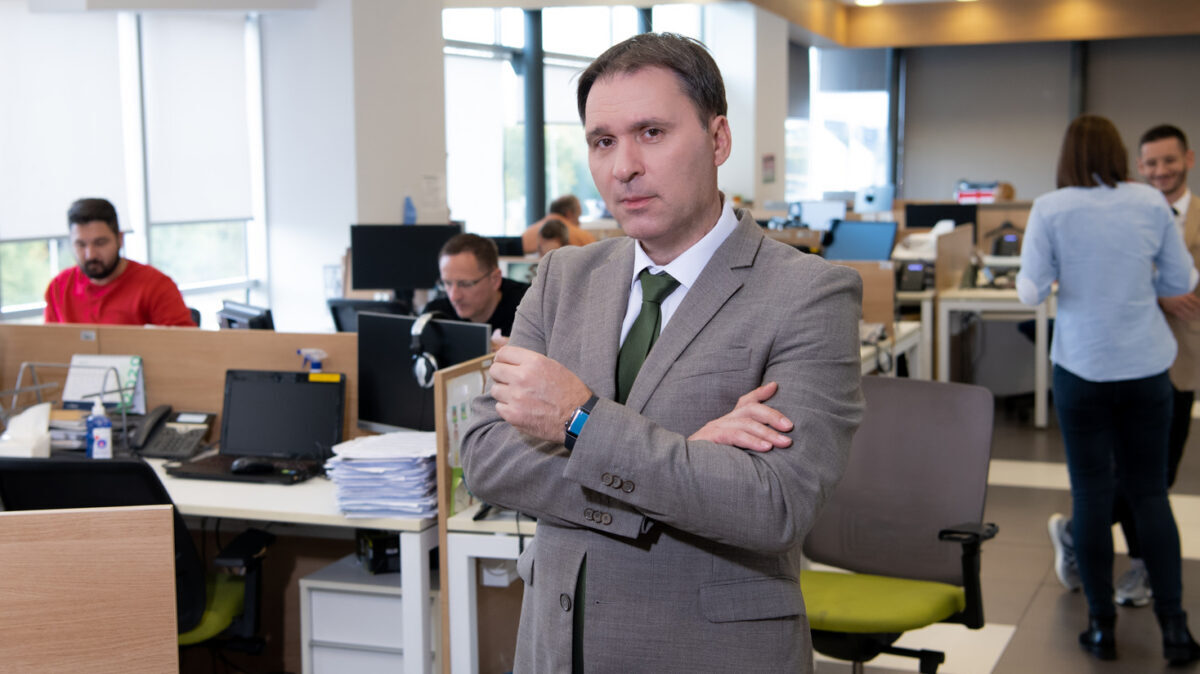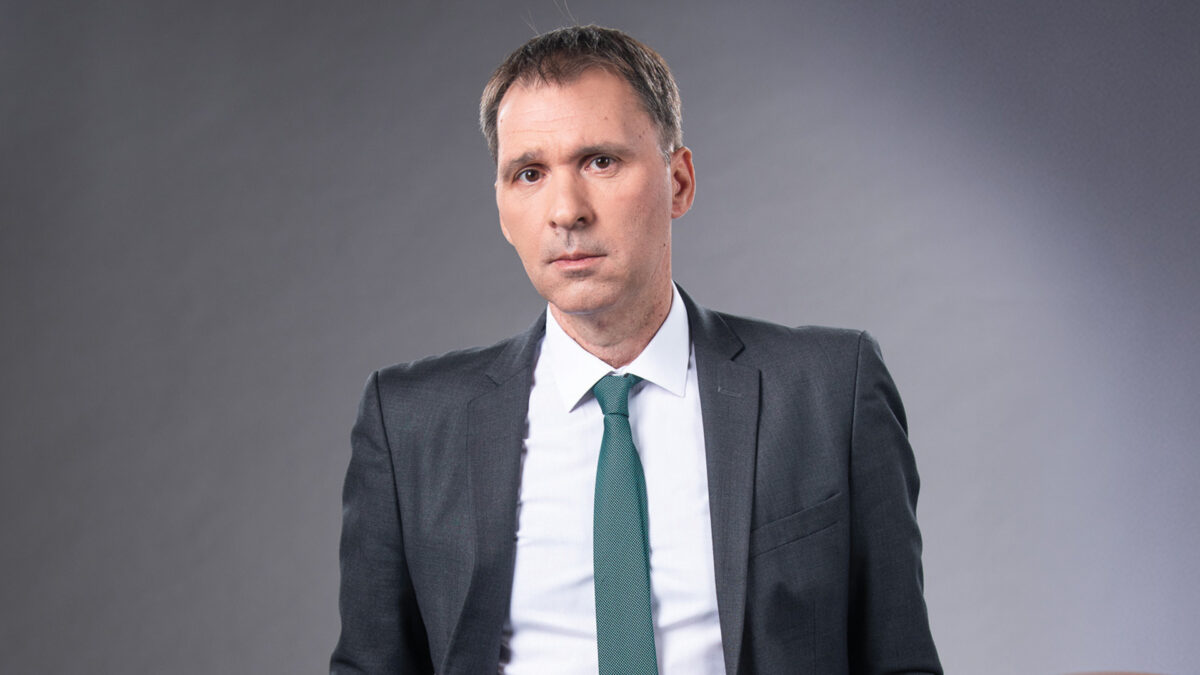We have new plans for a prime-time programme that will be even more dynamic and defined. Furthermore, we’ll have some fresh faces who will be a valuable addition to our team of journalists. We will be practically live from morning till late in the evening, so you will watch everything that happens on our TV station first
In the previous period, the N1 television has launched several new shows. In his interview, Igor Božić, News Director at N1 TV, talks about these shows, plans and his beginnings as a journalist.

You started your career on Studio B radio, before switching to the eponymous TV station. What did your early days as a journalist look like in the turbulent first half of the 1990s?
I started my journalistic career in probably the most challenging and dynamic media outlet at the time and the most experienced morning programme newsroom with Djoko Vještica and Bojana Lekić at its helm. This was the time of sanctions, wars and hyperinflation, we didn’t have mobile phones, the news arrived via fax machine and everything was very different. We had direct daily contact with the audience, who trusted us. We solved people’s problems by calling the relevant institutions which, at that time, were run by people who knew very well that it was better for them to pick up the phone and answer when one of Djoko Vještica’s journalists was calling, regardless of how bad the repercussions would be for them. We reported live via our Motorolas, which signal covered only the centre of Belgrade. As for other areas, we simply had to manage the best we could. For instance, we used to ask a local baker or shop owner to allow us to report live by using their landline phones.
So, everything was more complicated and challenging, but we quickly learned how to solve practical problems. Things weren’t much easier even at Studio B NTV. The RTS team, for instance, had five or six members but we always had only one cameraman and one journalist and were constantly struggling due to a lack of the much-needed technology and equipment. Literally, journalists had to learn to produce everything on their own. Sometimes we had to learn how to use a camera if our cameraman was not available. Sometimes we had to use a beat-up old car which often broke down and then, when that happened, figure out how to get up Bubanj Potok to reach the motorway and fill up the car’s water cooler with ordinary tap water (since distilled water was a luxury). We covered street protests and political rallies, but also reported from the battlefield, often with semi-working cameras. All of us who started our journalistic career back then didn’t do it because it brought a certain status, but because we sincerely believed that our job meant something, that conveying the right information and topics, which were hidden from the public even then, could help the public to finally get a real picture.
You switched from Studio B to the then BK Television and had your own show called Tête-à-tête, a form of a TV duel. Today, when such media format is almost extinct or has a much milder form, what do you think of the public dialogue back then compared to today’s?
Tête-à-tête was actually Tanja Jordović’s show, which I occasionally did. Even then, it was not easy to find two sides that would agree to a duel of opinions, but we succeeded. They did not need to get permission from the “boss”. Public figures were more independent back then, had integrity and not everything was prepared in advance. Spontaneity and sincerity are important for leaving an impression. I’m afraid we don’t have that anymore, not even in traces, when it comes to staged TV duels broadcast on privileged TV stations. I do not idealize the 1990s, but at that time, we had more options for dialogue and debate than today.
“On the other hand, I have to admit that I miss quality duel shows, and when I say ‘quality’, I am primarily referring to a debate with arguments and points of view, not a debate about facts”
Of course, the then president was out of reach for the free media, as is the current president of Serbia, but he was much less present in the media. At that time there were no social networks, so duels and dialogues were exclusively shown on TV, less often on the radio. Now, we a cacophony of noises and you can practically predict what someone will say. On the other hand, I have to admit that I miss quality duel shows, and when I say ‘quality’, I am primarily referring to a debate with arguments and points of view, not a debate about facts. It seems to me that, in Serbia, facts not points of view are discussed, which is a problem. That is not a debate, but a lying/distortion of the truth.
You have spent most of your career working for B92. Why, do you think, has such a large television company downgraded to today’s level?
The TV station that today bears the name ‘B92’ is not a real B92. I think that is completely clear to the audience. The sale of B92 to the Greek group Antenna led to a huge editorial change. The B92 TV that used to uncover scandals and bad moves by the state authorities now is covering them up. Everything that represented B92 was stricken off very quickly. Antenna then sold B92 to Copernicus and its programme became a carbon copy of pro-regime TV stations. B92 was a medium that grew out of youth radio, gathering people with specific energy and attitude during the 1990s, and then later at the beginning of this century. B92 used to be a part of the history of good, critical journalism, a kind of journalism that is now history at B92.
A certain part of the public perceives N1 in the same way as the former B92. What do you think about that?
A lot of N1 journalists did work for B92, but they still make a minority of N1’s editorial office. The audience sees N1 as an alternative to the pro-regime media, and that is probably one of the reasons for the analogy with B92. However, N1 is not B92 and should not be viewed as such. Foreign investors are the owners of N1 and we have an international board of editors.
We are formatted as a news channel. B92 has not survived the attempt to switch to the mainstream format, and N1 has been launched as the mainstream medium which has been growing for the last eight years.

N1 TV has been facing some kind of boycott by certain state officials. How difficult is it to maintain a balanced media image in such a situation?
We cannot simply give up if the government deliberately avoids N1 in an attempt to discredit it because it does not control it. That’s why we go to all the events to ask questions to government officials who refuse to come to our studio. Oftentimes, instead of answers, our journalists are met with insults, which makes the whole situation even more difficult. It is not easy to work in such circumstances, but it is the only possible way if you want to do the job professionally. It is also frustrating when politicians abuse their positions by spreading misinformation about N1, frequently presenting us as a political opponent.
Since last autumn, N1 has been broadcasting new shows with familiar faces. How did the audience react to these new projects?
Judging by the ratings measured by the TV Beat platform, the reception was very good. Our viewership is growing, and above all, new products such as the research and documentary show called ‘Ispod Površine’, then programmes like ‘Rekonstrukcija’, ‘Global Focus’, ‘Da Razumemo’ and ‘Iza Vesti’ with Danica Vučenić as an anchor. As always, we react quickly in every breaking-news situation and we are the audience’s first choice whenever something ‘big’ happens.
“As always, we react quickly in every breaking-news situation and we are the audience’s first choice whenever something ‘big’ happens”
This is our greatest advantage – to adapt quickly and give the audience the fastest and most accurate information. Along with the TV programme, our website is becoming increasingly influential, which has become evident when the war in Ukraine erupted or when we reported election results as they were coming in. In those two instances, N1 had the most-watched programme in the entire SBB network and our website also ranked in the top three sites in Serbia by the number of visits.
As a traditional medium, television does not hold much influence over the younger population. What do you think about the future of television, specifically in Serbia?
Indeed, the younger generations do not perceive TV as an exemplary medium. That is why we are equally committed to developing in the digital world too. However, it is difficult to expect that TV will become extinct as a medium. Rather, it is more realistic to assume that TV will be an important outlet for live events, that is sports and news. Entertainment, cultural and artistic content will probably soon be available to the public only on streaming platforms. However, the option to rewind or watch shows within the EON package (e.g. the N1 Izbor option) actually allows the audience not to have to adjust their time to the TV schedule. Younger generations use this feature, while older ones like to watch the programme live. However, the TV will survive, and it is up to us to adapt to the audience’s demands.
You have been the news director at N1 for nearly a year now. What are your plans for this TV station?
We have new plans for a prime-time programme that will be even more dynamic and defined. Furthermore, we’ll have some fresh faces who will be a valuable addition to our team of journalists. We will be practically live from morning till late in the evening, so you will watch everything that happens on our TV station first. Along with the expansion of our programme scheme, we plan to launch new digital content like podcasts and a substantial number of video clips that will be adapted to online audiences. The basis of everything is that we are free in an editorial sense and that no topics are taboo to us, and that will not change. We do not plan to gamble on hard-earned trust.